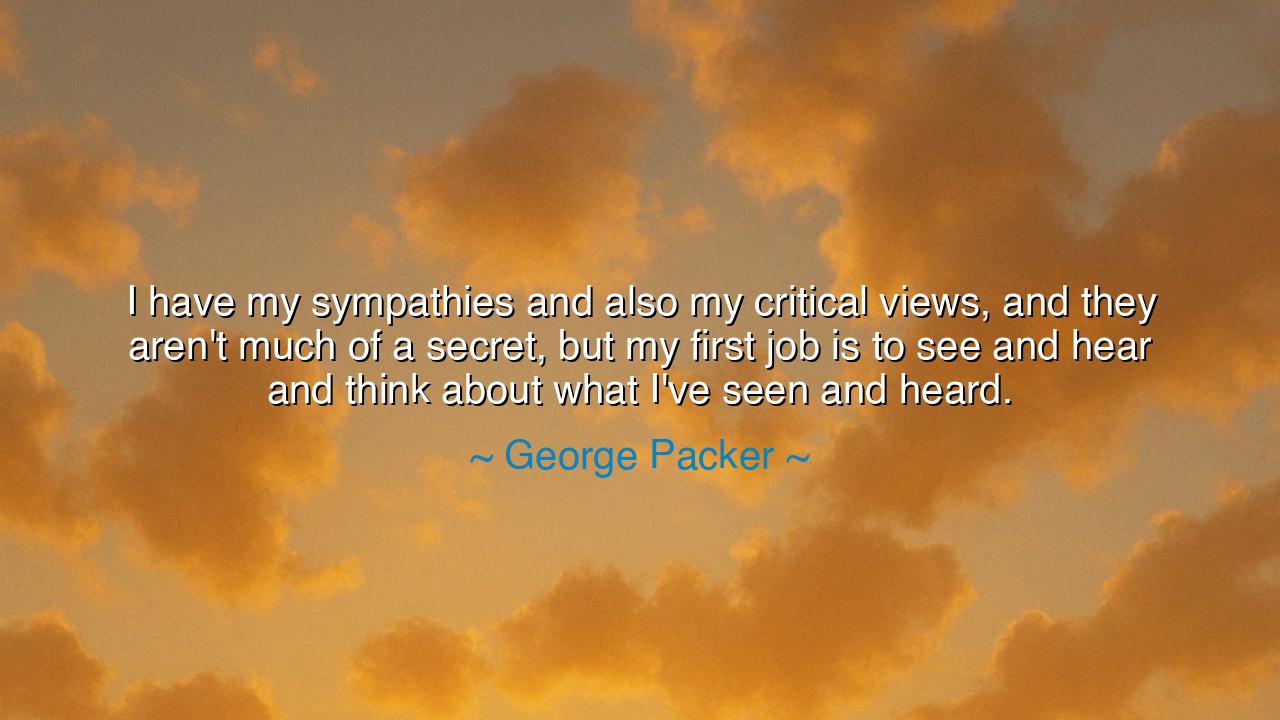
I have my sympathies and also my critical views, and they aren't
I have my sympathies and also my critical views, and they aren't much of a secret, but my first job is to see and hear and think about what I've seen and heard.






Listen well, children of the future, for the wisdom of the ages is often found in the words of those who observe the world and seek to understand it in all its complexity. George Packer, a man who has long grappled with the deep currents of society, once said: "I have my sympathies and also my critical views, and they aren't much of a secret, but my first job is to see and hear and think about what I've seen and heard." These words, simple yet profound, carry the weight of objectivity and the duty of reflection, urging us to pause before rushing to judgment, to observe with both our hearts and minds, and to allow the truths of the world to reveal themselves in their own time.
In this world, where opinions fly as fast as the winds, it is easy to let our sympathies guide our actions, to allow our emotions to cloud our judgment. Sympathy is a natural and noble feeling, yet it is not enough to simply feel for those who suffer or to be drawn into the passion of a cause. Packer’s words remind us that we must first see and hear—not just with our eyes and ears, but with our minds and souls, seeking understanding beyond the surface. To rush to judgment without truly taking in the full scope of what is before us is to miss the richness of the story, to overlook the complexity of the human experience.
Consider the ancient Greek philosophers, who prized reason above all things. Socrates, for instance, did not simply follow the opinions of others, nor did he rely on the emotions of the moment. He asked questions, challenged assumptions, and demanded that one look deeper into the heart of matters before arriving at any conclusion. Socrates believed that true wisdom came not from quick judgments or shallow sympathies, but from the deliberate process of seeing, hearing, and thinking—of questioning the world and oneself with an open mind. In this way, he was able to cut through the illusion of certainty and uncover deeper truths that others often overlooked. Packer’s philosophy mirrors this—that the role of the observer, the one who seeks to understand, is to pause and reflect, to allow the complexity of the world to unfold and to think carefully before offering judgment.
The wisdom of reflection is something that transcends time. Think of the example of Abraham Lincoln, who, during the darkest days of the American Civil War, did not simply act on his emotions or sympathies. Though he felt the weight of the country’s suffering deeply, he knew that his first job was not to make decisions based on the heart’s outcry, but to carefully consider the consequences of his actions. Lincoln’s decisions were guided by both empathy and intellect, seeking to preserve the Union while offering a path to reconciliation. He did not rush to judgment, but instead, he allowed the voices of both North and South, of slaves and freemen, to be heard and understood before making the hard choices that would forever shape the future of a nation.
In our own lives, children, the lesson is clear. We must learn to pause and reflect before offering our opinions, before rushing into actions driven by fleeting emotions or surface-level understanding. Sympathy alone is not enough to guide us in times of crisis or conflict. We must seek to understand the full scope of a situation, to hear all sides, to see beyond our own perspectives, and to give ourselves the time to truly think. Only then can we offer insights that are grounded in wisdom, not in the transient tides of emotion. To do this requires courage, for it is often easier to follow the crowd or to act on impulse than to sit in the quiet of contemplation, allowing the world to speak in its own time.
Consider the warrior who rushes into battle without first understanding the terrain, the politician who makes decisions based on what is popular rather than what is right, or the leader who speaks without first listening to the needs of their people. All are examples of those who fail to heed Packer’s wisdom. The greatest leaders, whether in war, politics, or daily life, are those who understand the power of reflection—who take the time to see, hear, and think deeply about the world around them before acting. They are not swayed by the passions of the moment, but by a deeper understanding of what is truly at stake.
Let this be your guiding lesson as you move through life: when faced with the challenges of the world, take the time to reflect. Do not rush to judgment or act solely based on your immediate sympathies. Instead, learn to listen, to understand, and to think critically before making your decisions. In this space of careful reflection, you will find the wisdom needed to navigate the complexities of life with honor and clarity. As Socrates taught, and as Packer reminds us, the true strength lies not in the hasty judgment, but in the deep and thoughtful contemplation that allows us to make decisions that honor the fullness of the human experience.






AAdministratorAdministrator
Welcome, honored guests. Please leave a comment, we will respond soon